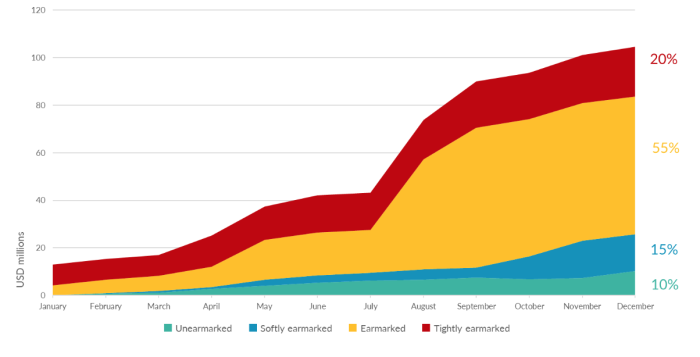At the end of 2022, the Democratic Republic of the Congo (DRC) hosted more than 522,000 refugees and asylum-seekers, mainly from Burundi, the Central African Republic (CAR), Rwanda and South Sudan. Another 5.5 million people were internally displaced due to insecurity and widespread violence against civilians, making the DRC the largest internal displacement situation in Africa. In most cases, internally displaced people in the DRC cannot return to their homes due to ongoing insecurity, destruction to their property and a lack of basic services such as education, health and water. As many as 132 armed groups have been reportedly operating in the east, launching deadly attacks on civilians and ultimately contributing to large population movements within and outside the country, in addition to posing serious challenges to humanitarian operations.
More than 60 million Congolese (64% of the country's population) live below the poverty line of $2.15/day.

In 2022, the DRC received $27 million in flexible funding, the largest amount in the Southern Africa region, in absolute terms, although other smaller operations relied on flexible funding to a greater degree. UNHCR regularly relies on flexible funding to fill funding gaps in neglected crises, as well as to cover emergency or urgent needs.
The total allocated to the DRC, including $13.6 million in unearmarked funds and $13.4 million of softly earmarked funds, covered one quarter of UNHCR's expenditure in the country. This injection of funds enabled UNHCR to do more, especially in child protection, local integration, protection policy and law, voluntary repatriation, resettlement, gender-based violence, education, self-reliance and health. In all these areas, flexible funding accounted for more than 25% of UNHCR's expenditure.
In absolute terms the largest allocations of flexible funding went to voluntary repatriation and to community engagement and women's empowerment, which received $3.9 million and $3.7 million respectively. During the year, over 9,000 refugees were voluntarily repatriated from the DRC, although the number could have been much higher if sufficient funds had been available. Investments in community engagement helped to fund 270 community groups, many of which put their own community protection plans into action, strengthening local protection and early warning systems in areas where UNHCR is not present. UNHCR and its Government counterpart, the Commission Nationale pour les Refugiés, have put in place feedback mechanisms reaching an estimated 81% of affected populations, which helped to improve interventions by UNHCR and its partners in 2022.
The war in Ukraine not only contributed to a sharp increase in the price of energy and agricultural products in the DRC, but also a global shift in focus and financing away from protracted crises. Against this backdrop, the need for continued flexible funding is critical to meet the needs of forcibly displaced people in the DRC.